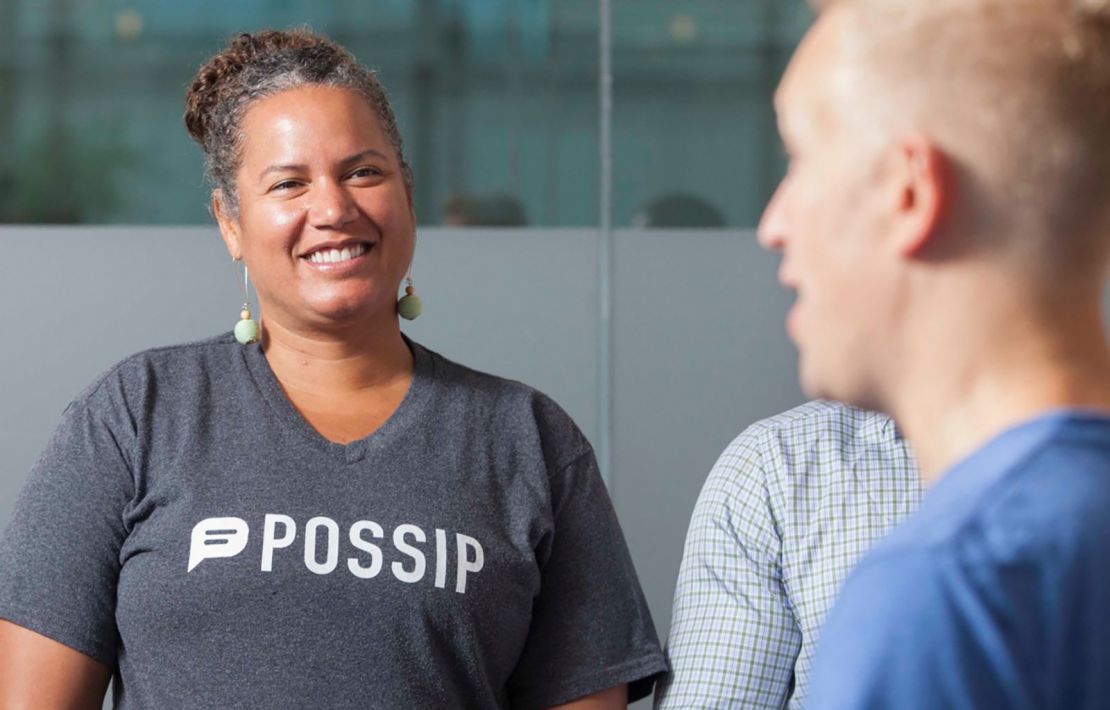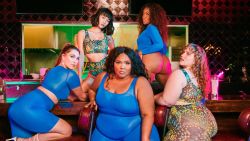Two years ago, Shani Dowell gave up a stable career and much of her bank account to take a chance on a business idea.
?As a mother and a former math teacher, she knew not all parents felt comfortable raising important feedback to teachers and school administrators. Instead, she found, they’d often chat amongst themselves about issues that came up at school.
There had to be a better way, she thought, so she founded Possip.
?Short for “positive gossip,” the startup, which schools subscribe to annually, uses text messages to get quick surveys and reactions from parents ranging from praise for teachers to feedback on bullying and school culture.
?Despite early success getting parents and administrators interested, however, initially attracting investors to scale up the small company was an uphill battle.

“When I originally would go out and pitch Possip to people, especially to typically wealthier men, they sometimes didn’t understand the problem, and part of why they potentially didn’t see the problem is because they may not have ever had the experience of not feeling entitled and empowered to share their voice or share their opinions,” Dowell said.
“Some investors in the education technology space had a jarring disconnect from what was happening at schools and what parents might actually need,” she said.
Luckily, after running the company for almost three years, Dowell had insights from roughly 100 schools to back her up, and finally, she found an institutional investor, too: LaunchTN, a public-private partnership led by a female CEO and funded in part by the State of Tennessee.
Today, Possip has a presence in 700 schools across 24 states. And Dowell is one of the few Black women in the US who have raised $1 million or more in funding for their businesses.?
Although Black women are the fastest-growing group of female entrepreneurs in the United States, they’ve long been slighted by startup investors and significantly under-funded. But in spite of the obstacles they face, these founders are forging ahead and continuing to thrive in their businesses.
In fact, the number of Black women who have raised over $1 million in funding has more than doubled since 2018, according to ProjectDiane, a biennial report released Wednesday.
The report, which tracks publicly-announced funding of Black and Latinx women-founded businesses, is compiled by digitalundivided, a nonprofit focused on supporting entrepreneurial women of color. It uses data from Crunchbase and Pitchbook to track crowdfunding, angel, seed and venture round investments. It’s possible the data doesn’t include some founders who are not listed in those databases or didn’t disclose funding publicly.
According to ProjectDiane, at the start of 2018, just 34 Black women had raised $1 million or more in outside investments for their businesses. But now, in data tracked through August 2020, more than 90 Black women have hit or exceeded that level. The numbers of Latinx women who’ve reached that milestone also grew quickly, although they remain incredibly underrepresented in VC circles, too. Still, it’s an impressive upswing that could signal a shift in a startup landscape largely dominated by White men.
This milestone comes amid a backdrop of protests against systemic racism and an unprecedented push to support and buy from Black-owned businesses. Founders and advocates are hoping to build upon that momentum, but also wonder if the support being shown to Black-owned businesses, let alone those founded by Black women, is here to stay.?
“Businesses founded by women of color are in focus now, and specifically those founded by Black women because of the racial reckoning,” said Lauren Maillian, CEO of digitalundivided. “But we want and we need to make sure that they continue to gain great investment moving forward.”
Bridging the funding gap is long overdue?
The number of businesses owned by Black women grew 50% from 2014 to 2019, the fastest growth among all female entrepreneurs, according to American Express projections based on Census data. Black women make up nearly 14% of the female population in the US, but 42% of all new women-owned businesses during that time.
Many of these companies are small, local businesses and not necessarily seeking outside investors. That said, for those founders who are focused on scaling up quickly, there’s a huge gap between their entrepreneurial ambitions and the funding they’re able to secure: Black women have received less than 1% of venture capital funding, analyzed by ProjectDiane since it started tracking the data.
Perhaps not coincidentally, few Black women are in a position to make decisions on how capital is invested in startups. Only 4% of the VC workforce is Black, and only 3% of the people actually leading investments are Black, according to data from the National Venture Capital Association.
“You have this huge deficit within the ecosystem for Black women,” said Dell Gines, senior community development advisor at the Federal Reserve Bank of Kansas City who conducted a year-long study on startups owned by Black women released in 2018.
“Venture capital is by and large a network-based industry, where you have a series of gatekeepers and other hurdles to get in front of because there’s greater demand for capital than there’s usually supply. You also have these filtering mechanisms that traditionally don’t include people of color and women, because that’s how the networks originated.”
There’s been improvement in the last couple years, but not enough to close the gaps.
Collectively, Black women founders raised $700 million in 2018 and 2019, up from $289 million raised in 2009 to 2017, according to ProjectDiane. Despite the major increase, however, Black women founders accounted for just 0.27% of the $276.7 billion in startup funding raised by all companies in those years, as tracked by Pitchbook.
The dearth in numbers stems back to a number of well-documented reasons including unconscious bias, systemic barriers and gender and racial stereotyping. The missed opportunity and economic cost of not investing in Black women is huge, Gines said.
“If you improve the rate of Black women entrepreneurship — their ability to grow and scale — then you improve the entire community,” he said, pointing to research that connects entrepreneurship growth rates with economic growth.
Black women aren’t newcomers to entrepreneurship. Even before women could vote, they owned businesses.?
“We’ve been entrepreneurs. As soon as we could actually control our own destinies, create our own and monetize our own ideas we’ve been doing it,” said Kathryn Finney, founder of digitalundivided and The Doonie Fund, which makes microinvestments in Black-women-owned businesses. “It’s just been times throughout our history where that desire, that force has been artificially depressed by outside forces.”?
Raising funds is not a one-size-fits-all
Black women may now be starting businesses at a record pace, but they’re still having to overcome massive obstacles in doing so.
Among Black women business owners, 66% describe access to credit and funds for expansion as one of their greatest financial challenges. Only 39% of their nonminority peers say the same, according to the Federal Reserve System’s 2016 Small Business Credit Survey, which is based on a convenience sample of businesses.
Black women also reported being less likely to receive some or all of the financing they requested and are significantly more likely to not apply for financing because they felt discouraged by a lack of credit opportunities. ? ?
Rather than turn to debt or equity financing to fund their businesses, many rely on financial reserves like their savings as the main source of startup capital.? According to the Fed survey, 31% of Black women business owners rely on personal funds to finance their businesses, whereas only 16% of nonminority women business owners say the same.
Much of those reserves, Finney says, come from “our own personal funds, maybe refinancing our mortgages, or taking loans from our 401(k), all things that impact our long-term wealth.”
?That was the case for Denise Woodard, a former Coca-Cola executive. She was spurred to create Partake Foods, an allergy-friendly snack company, nearly four years ago in response to her daughter’s food allergies.
Woodard started off with a Kickstarter campaign before raising capital from family and friends. In spite of the growing traction her products were getting and local placement in Whole Foods and Wegmans, Woodard was forced to empty her 401(k) and sell her engagement ring to keep the company going.
“It was definitely difficult,” she said. “It was coming in dribs and drabs of like $5,000 and $10,000 checks and not fast enough.”
But a breakthrough finally did come.
After being turned down by nearly 100 investors, Woodard received the ‘yes’ she needed from Jay-Z’s Marcy Venture Partners, which led a seed round of $1 million for the company last summer that also included her former Coca-Cola boss, Chuck Muth, now chief growth officer of Beyond Meat and The Factory.

She’s since raised new investment from Grammy award-winning singer H.E.R. along with additional funding from Marcy Venture Partners. And the company’s footprint has expanded to nearly 3,000 stores including retailers such as Target, Whole Foods, Sprouts and Wegmans.
Woodard is also trying to boost Black and brown representation in the food and beverage industry, with the launch of a fellowship program for students at historically Black colleges and universities to explore career pathways at consumer-packaged goods companies. She hopes the program can make the journey smoother and more seamless for others.
“As I’ve grown the company, I’m realizing that Partake has the opportunity to stand for something much larger than people with food allergies being able to partake, and just this bigger feeling of inclusivity and everyone having a seat at the table, regardless of their gender, race, socioeconomic class or food restrictions, this idea that everyone is welcome,” Woodard said. “I started Partake with a tiny picture, and it’s really broadened a lot since we’ve been in business.”
Changing the ecosystem
The country’s racial reckoning may have sparked some new efforts to rectify years of gross underfunding of Black women founders, but there were a number of positive forces that emerged even prior to 2020.
New funds, online communities, programs and alternative sources of funding are focusing on diversifying who receives startup capital.
One significant example, the New Voices Fund was launched in 2017 when Unilever acquired Sundial Brands, the maker of SheaMoisture and other skin care and hair care lines. Richelieu Dennis, Sundial’s founder and then-CEO, created the New Voices Fund to invest in companies run by women of color, and Unilever became an anchor investor as part of the partnership. To date, the fund has invested more than $60 million. Companies like The Honey Pot, The Lip Bar and Mielle Organics, all of which are now available in Target stores, were able to expand in part due to those investments.
Another effort, Founder Gym, founded by Mandela SH Dixon, is an online training program for underrepresented founders including Black women, which teaches them how to raise money to scale their startups. Several of the more than 90 Black women who have raised millions for their startups have been a part of the program, including Shani Dowell of Possip, as well as Olamide Olowe, who founded Topicals, a skincare brand for people with chronic skin conditions and Jasmine Shells, who cofounded Five To Nine, an event management platform.
Another such example, Black Girl Ventures, a nonprofit organization launched by Shelly Bell in 2016, has helped to scale more than 100 Black and brown women-owned businesses across 12 cities through its pitch competitions.
Many Black women founders have also found success by tapping into alternative sources of capital such as crowdfunding.
Dawn Dickson-Akpoghene raised over $1 million in an equity crowdfunding campaign in 2019 for her company PopCom, which makes touchless vending machines for regulated products like alcohol, tobacco and cannabis. The founder of Ethel’s Club, Naj Austin, raised $25,000 by using crowdfunding to establish her company, a social and wellness club for people of color. She went on to raise more than $1 million from institutional and angel investors.
These efforts haven’t come just on the founder side. There have also been a number of initiatives pushing for more diversity among the investors who make decisions on who gets funded and why in the startup landscape. Organizations such as All Raise, BLK VC and HBCUvc have focused on accelerating representation of Black and women investors to build a more equitable ecosystem in venture capital.
With these efforts combined, advocates like Maillian from digitalundivided hold hope that even beyond the moment of racial reckoning in 2020, Black women founders will still continue to thrive.
“We have a culture of embracing entrepreneurship as Black women and seeing other Black women continue to do it is what really makes the difference,” she said. “And signals to our peers and to future generations, what is truly possible.”
— An earlier version of this story included the wrong title for Queen Chinyere Quinn in a photo caption. She is the cofounder of Fraym and Kupanda Capital.
PHOTO CREDITS: Incredible Health, Adrian Atwood/Connected Commerce Council 2020, Civic Eagle, Alex Newman, Cityblock Health, Mixtroz, Lennox Armstrong, Nicholas Peter Wilson, Dmitri Oleynik, Richard Smith, Melissa Bradley/1863 Ventures, Rich Gilligan, Phillip Faraone/Getty Images for Wired25, Bre’Ann White, ShearShare, Felicia Kieselhorst Photography, Lori Wilson Photography, Vanessa Lenz, Karen Hernadez, Planet FWD, Cheryl Contee, Noemie Tshinanga, Tony Cash/Park Hill Multimedia, Annette Patko, Robin L Marshall/Getty Images for BET, Jehan LLC, Paras Griffin/Getty Images for ESSENCE, Fiveable, Itzel Gonzalez, Jenny Groza, Ashley Edwards, Sasha Craig Photography, Courtesy of NaturAll, Madi King Erger, Panty Prop Incorporated, Kenn Stearns, Hearst, Robin L Marshall/Getty Images for BET, Aaron Ricketts, David Land, Jenna Schonfeld, John Phillips/Getty Images, Kira Voss Photography, Lauren Crew, Kellee James, Daniel Vasquez, Ashleigh Bing, James Jones Jr., Matthew Suyetsugu/BlackLine Media Group, Sergio Garcia, J. Lauryn Photography, Nicola Harger, Yumi Matsuo, Alain Ngann, Tony Bowen Photography, Chi-Chi Ari/PoweredByCue, Yolanda Richards, Elizabeth Defreest, Uncharted Power, Nick F. Nelson/Brandpreneur, Gro Intelligence, Naza Beauty, Joseph Ford, Breyona Holt, Keith Munyan, Claire Harvey, Neriah McNair, Eclipse Corp, H. Bernard Rogers, 1871 Chicago, Nadine Priestley, Amy Robertson, Fiona Aboud, Steve Reddell/Eskalera, Amy Bolger Photography, Jack Lindholm/Conde Nast, Colleen Bies, Michael Benabib, @thebrosfresh, Partake

















